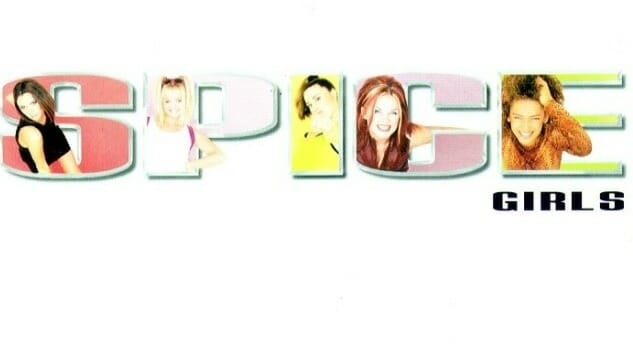
I’m not a person who remembers every year of their lives detail for detail. But I’ll always remember the day I found the Spice Girls. It was 1996, I was 10 years old and I was spending the summer at day camp. Only it wasn’t a hiking-and-color-war sort of camp; it was a JCC-sponsored program that had us spending most days inside(!) in a rec room playing ping-pong and watching MTV. (Which of course meant that I was in heaven. Minus the ping-pong.)
One day, I was glued to the tube watching music videos while my friends were probably engaged in some more physically demanding activity. Marilyn Manson’s “The Beautiful People” was on, and I was trying (unsuccessfully) not to cover my eyes. Then, up next, seemingly out of nowhere, MTV queued up a clip from a then-unknown-in-the-States five-piece pop act: the Spice Girls. It was the video for “Wannabe”—a brazen, ballyhooing call for fun, frolicking and most importantly, friendship. The girls dashed around a nice hotel, threw stuff in the air, did high kicks, challenged their onlookers to join them. So what if the lyrics didn’t make a lot of sense (to this day, just what the hell is a “zig-a-zig-ah?”); it was the girls’ energy and freewheeling positivity that made them contagious.
I was hooked. Who were these skipping, backflipping, infectious women, who, instead of rhapsodizing about relationships, set conditions on their time (“If you wanna be my lover / You gotta get with my friends”) and cavorted through upscale establishments with nary a care in the world at whom they might offend? Even at 10 I could tell: You can market a band with cute clothes and catchy nicknames (Scary, Ginger, Baby, Posh, Sporty, etc.), but it’s much harder to manufacture that kind of camaraderie.
Of course it wasn’t long before I ran to the nearest music store and purchased a tape of the Spice Girls’ now-20-year-old debut, Spice, so I could listen to my new favorite song anytime I pleased. What I found in that album and in its following singles that, like “Wannabe,” each track made a point to value female friendship and self-respect (“I’ll give you everything / On this I swear / Just promise you’ll always be there,” they advise on “Say You’ll Be There”). They even give a special shout out to safe sex (“2 Become 1”) and family on “Mama,” where they basically apologize to their moms for being such brats as teenagers.
Along with the Spice Girls’ rise came their suddenly omnipotent catchphrase, “GIRL POWER!” Meant to match their show of positivity, their favorite two words weren’t about one gender superseding the other—it was only ever about women supporting and loving one another. Did the phrase itself begin to oversaturate popular culture in the ‘90s? Possibly. Has it been sandwiched into discussions of feminism in in the years to follow? Of course. But a longer look at its origins and parallels to the Spice Girls’ music and mission reveals its timeless intentions: to spread the love.
Unlike many of the boy bands that followed in the ‘90s, the Spice Girls were careful to give each member solos (yes, even Victoria) and screen time. (Can a band like *NSYNC or the Backstreet Boys say the same, with eye candy like Nick Carter or Justin Timberlake at the forefront of every song, video and photo shoot?) But in every Spice Girls music video, interview, live performance and even in their 1997 motion picture, Spice World, the five are presented as a unit, clasping hands, hugging, laughing, joking, touching, sharing the spotlight. There were no hidden agendas to outshine the person next to them. Each member brought something tangible to the table. (Which of course might explain their rapid demise after Geri left in 1998, but I digress.)
It’s difficult to say if any pop act has demonstrated the same call for female friendship. There is, of course, Taylor Swift, whose collection of female friendships can sometimes feel like a live-action Pokemon game, except instead of Pokemon, it’s celebrities and runway models. Swift’s show of female support is admirable, but its carefully constructed quality can feel at times inauthentic. Fifth Harmony sing about taking female togetherness on “Me & My Girls,” but watch them in any interview, video or live performance and it’s clear that their chemistry appears staged. It’s as if each girl is wearing blinders as if to pretend that the stage is theirs alone.
The only act that comes close to transmitting a convincing portrait of contemporary Girl Power is Spice Girls acolytes Little Mix, who sing about their wish to “represent all women” on “Salute” and leaning on friends to get over an old flame in “Hair” and the ebullient “Shout Out to My Ex.” That authenticity is only bolstered by little things like the girls’ group hugs in the videos for each song, not to mention how they channel another famous group of friends, the cast of ‘90s cult classic The Craft, in the video for “Black Magic.”
Watching the Spice Girls as a preadolescent naturally made me want something. But it wasn’t like what I felt when I read issues of YM and Seventeen, which made me yearn to fix or improve aspects of my imperfections. And even today, it’s not like how I feel when I watch someone like Taylor Swift, who makes a show of female support but only succeeds in making me want to hit the gym and buy red lipstick and Reformation dresses. No, the Spice Girls made me want something else. Something that’s much harder to sell: companionship.